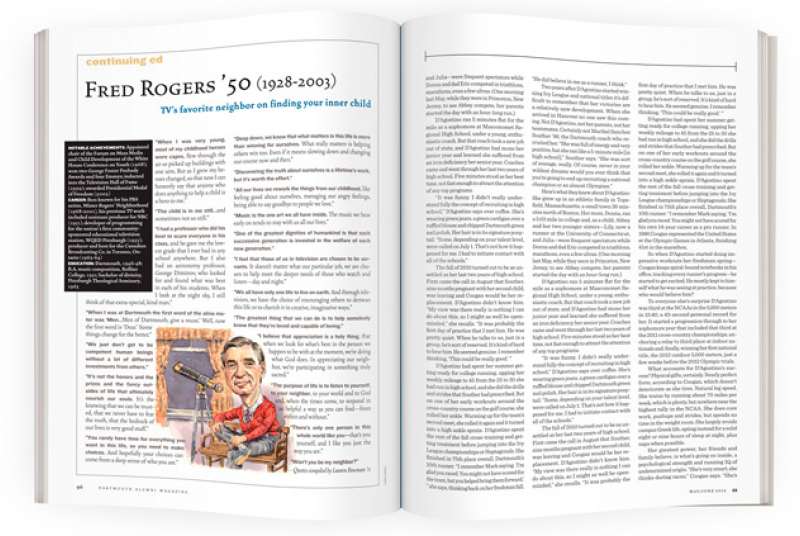
Fred Rogers ’50 (1928-2003)
Notable Achievements: Appointed chair of the Forum on Mass Media and Child Development of the White House Conference on Youth (1968); won two George Foster Peabody Awards and four Emmys; inducted into the Television Hall of Fame (1999); awarded Presidential Medal of Freedom (2002)
Career: Best known for his PBS series, Mister Rogers’ Neighborhood (1968-2001), his previous TV work included assistant producer for NBC (1951); developer of programming for the nation’s first community-sponsored educational television station, WQED Pittsburgh (1953); producer and host for the Canadian Broadcasting Co. in Toronto, Ontario (1963-64)
Education: Dartmouth, 1946-48; B.A. music composition, Rollins College, 1951; bachelor of divinity, Pittsburgh Theological Seminary, 1963
When I was very young, most of my childhood heroes wore capes, flew through the air or picked up buildings with one arm. But as I grew my heroes changed, so that now I can honestly say that anyone who does anything to help a child is a hero to me.”
“The child is in me still…and sometimes not so still.”
“I had a professor who did his best to scare everyone in his class, and he gave me the lowest grade that I ever had in any school anywhere. But I also had an astronomy professor, George Dimitrov, who looked for and found what was best in each of his students. When I look at the night sky, I still think of that extra-special, kind man.”
“When I was at Dartmouth the first word of the alma mater was ‘Men…Men of Dartmouth, give a rouse.’ Well, now the first word is ‘Dear.’ Some things change for the better.”
“We just don’t get to be competent human beings without a lot of different investments from others.”
“It’s not the honors and the prizes and the fancy outsides of life that ultimately nourish our souls. It’s the knowing that we can be trusted, that we never have to fear the truth, that the bedrock of our lives is very good stuff.”
“You rarely have time for everything you want in this life, so you need to make choices. And hopefully your choices can come from a deep sense of who you are.”
“Deep down, we know that what matters in this life is more than winning for ourselves. What really matters is helping others win too. Even if it means slowing down and changing our
course now and then.”
“Discovering the truth about ourselves is a lifetime’s work, but it’s worth the effort.”
“All our lives we rework the things from our childhood, like feeling good about ourselves, managing our angry feelings, being able to say goodbye to people we love.”
“Music is the one art we all have inside. The music we hear early on tends to stay with us all our lives.”
“One of the greatest dignities of humankind is that each successive generation is invested in the welfare of each new generation.”
“I feel that those of us in television are chosen to be servants. It doesn’t matter what our particular job, we are chosen to help meet the deeper needs of those who watch and listen—day and night.”
“We all have only one life to live on earth. And through television, we have the choice of encouraging others to demean this life or to cherish it in creative, imaginative ways.”
“The greatest thing that we can do is to help somebody know that they’re loved and capable of loving.”
“I believe that appreciation is a holy thing, that when we look for what’s best in the person we happen to be with at the moment, we’re doing what God does. In appreciating our neighbor, we’re participating in something truly sacred.”
“The purpose of life is to listen to yourself, to your neighbor, to your world and to God and, when the times come, to respond in as helpful a way as you can find—from within and without.”
“There’s only one person in this whole world like you—that’s you yourself, and I like you just the way you are.”
“Won’t you be my neighbor?”










